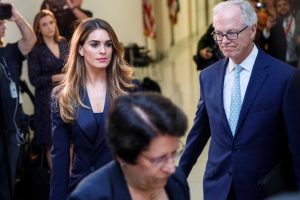Washington, Jun 19 (EFE).- Hope Hicks, President Donald Trump’s former communications director, on Wednesday avoided answering questions put to her by House lawmakers about her time in the White House, her testimony coming as part of the lower chamber’s investigation into possible obstruction of justice by the president.
Hicks, who up until March 2018 was one of Trump’s closest advisers, appeared before the Democratic-controlled House Judiciary Committee in a closed-door session.
That panel is investigating whether Trump obstructed justice during the two-year independent probe by Special Counsel Robert Mueller of his 2016 campaign’s links and contacts with Russia.
Mueller wrapped up his probe earlier this year and issued a 400-plus page report on his findings, which included possible instances of Trump’s obstruction of justice although the special counsel did not bring any criminal charges against the president, saying that to do so against a sitting president would be unconstitutional. He left to Congress the task of pursuing any further investigations into whether or not to impeach Trump for high crimes or misdemeanors.
But Hicks refused to respond to questions related to her time in the White House and on Trump’s transition team after he won the 2016 election, and she only answered questions related to the presidential campaign, according to lawmakers from both parties consulted by The New York Times.
Hicks cited Trump’s instructions that, she said, give her “absolute immunity” from the obligation to answer lawmakers’ questions about her White House tenure, according to the daily.
In fact, she appeared before the House committee with a letter from White House counsel Pat Cipollone stating that Trump directed Hicks not to answer any questions “relating to the time of her service as a senior adviser to the president.”
Cipollone also said that Hicks, as one of Trump’s former senior advisers, is “absolutely immune” from being compelled to provide testimony with respect to her service to the president because of the separation of powers between the executive and legislative branches.
Democrats in Congress and their legal advisers do not agree with this claim.
Trump already tried in May to block the testimony before Congress of former White House counsel Don McGahn, although in that case he cited the doctrine of executive privilege, which is distinct from that of the supposed “absolute immunity” of presidential advisers and, experts say, has a more solid legal basis.
The committee is planning to publish later this week a transcript of the session, which lasted about three hours, during which lawmakers attempted to find out from Hicks about whether she was aware of the payment that Trump’s former personal attorney, Michael Cohen, made in 2016 to silence two women who had had intimate relations with the president years ago.
Trump’s oldest son, Donald Jr., also appeared last week behind closed doors before the Senate Intelligence Committee, although in his case his appearance was required by senators so they could question him about whether he had earlier lied to lawmakers about his contacts with Russians in 2016.

Ex-asesora de Trump evita preguntas del Congreso
Washington, 19 jun (EFE).- Hope Hicks, exdirectora de Comunicación de la Casa Blanca, evitó este miércoles contestar las preguntas de los legisladores sobre su periodo como asesora del presidente de EE.UU., Donald Trump, dentro de una investigación de la Cámara Baja sobre la posible obstrucción a la justicia del mandatario.
Hicks, que hasta marzo de 2018 fue una de las asesoras más cercanas a Trump, compareció a puerta cerrada ante el Comité Judicial de la Cámara de Representantes de EE.UU., controlada por la oposición demócrata.
Ese panel investiga si Trump incurrió en obstrucción a la justicia en relación con la pesquisa sobre la presunta injerencia rusa en las elecciones de 2016, concluida este año por el fiscal especial Robert Mueller.
Pero Hicks se negó a responder a las cuestiones relativas a su periodo en la Casa Blanca y al equipo de transición de Trump tras las elecciones de 2016, y únicamente contestó a las que se referían a la campaña presidencial del ahora mandatario, según congresistas de ambos partidos consultados por el diario The New York Times.
Hicks citó instrucciones de Trump que, según ella, le daban una “inmunidad absoluta” respecto a la obligación de contestar a las preguntas, de acuerdo con el rotativo.
De hecho, acudió a su cita en el Congreso armada con una carta del abogado de la Casa Blanca, Pat Cipollone, que afirmaba que “el principio de inmunidad para los asesores más destacados del presidente tiene raíces firmes en la separación de poderes establecida por la Constitución”.
Trump ya trató en mayo de bloquear el testimonio ante el Congreso del exabogado de la Casa Blanca Don McGahn, aunque en ese caso citó la doctrina del privilegio ejecutivo, que es distinta de la de “inmunidad absoluta” de los asesores del presidente y, según expertos, tiene una base legal más sólida.
El comité planea publicar esta semana una transcripción de la sesión, que duró unas tres horas, y en la que los congresistas preveían presionar también a Hicks sobre si estuvo al tanto del pago que el abogado de Trump, Michael Cohen, hizo en 2016 para silenciar a dos mujeres que tuvieron relaciones con el ahora presidente.
El hijo mayor de Trump, Donald Jr., también compareció la semana pasada a puerta cerrada ante el Comité de Inteligencia del Senado, en su caso debido a las sospechas de los senadores de que podría haber mentido a los legisladores sobre sus contactos con rusos en 2016.
